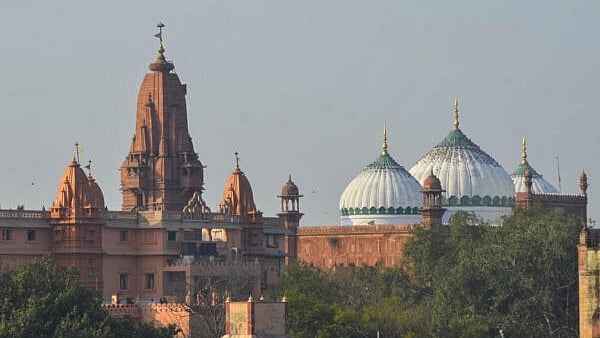
Shahi Idgah mosque and Shri Krishna Janmabhoomi Temple, in Mathura. (For representational purpose)
Credit: PTI File Photo
New Delhi: In a significant development, the Supreme Court on Thursday directed that no fresh suit with regard to religious places or shrines can be registered or a survey be ordered by the district courts till the matter related validity of the Places of Worship (Special Provisions) Act, 1991 is pending before it.
"When the matter is sub judice before this court, will it not be proper for others to stay their hands off," a bench of Chief Justice of India Sanjiv Khanna and Justices Sanjay Kumar and K V Vishwanathan asked, rejecting the contention by those opposing the validity of the law.
The court said that though fresh suits can be filed, those would not be registered and no effective --interim or final -- order would be passed by the district courts on suits claiming existence of temples beneath mosque or dargah.
The recent orders by the district courts for conducting of survey of a mosque at Sambhal in Uttar Pradesh and Ajmer in Rajasthan has caused a lot of casternation, triggering a clamour to implement the 1991 law which mandated for maintaining the status quo of religious places as existed on August 15, 1947.
Sambhal witnessed a huge protest resulting into death of at least four persons last month in violence erupted after the survey order.
Taking up a batch of matters, the court gave the Union government further four weeks time to file its reply to the petitions challenging validity of the 1991 law.
The court noted no response has been filed by the Centre also to the petition seeking implementation of the law.
“We can't decide this without Centre's response," the bench said.
The newly constituted bench rejected the opposition to its restraint order on entertaining of fresh suits by the counsel challenging the validity of the law, who contended such an order can be passed only after hearing the parties.
"No proceedings can be undertaken even if suits can be filed...When the matter is sub judice before this court, will it not be proper for others to stay their hands off...Till we are examining the matter, no effective order or survey order can be passed," the bench said.
The Places of Worship Act, 1991 was enacted by the P V Narasimha Rao government at the height of Ram temple movement. The law was meant to protect status of religious places as existed on August 15, 1947.
About 20 suits across the country have been filed for conducting survey at different religious places including mosque and dargah, which, the Muslim sides claimed, had been in disregard to the provisions of the law.
The court restrained the trial court across the country from taking cognizance of any fresh suits filed claiming that mosques were earlier Hindu temples, which were destroyed during the Mughal rule. The order is a virtual stay on all cases relating to reclamation of temple structures across the country.
"The matter requires consideration…once we say issues regarding Section 3 and 4 (of the Act) require consideration, will it not be proper that there is a stay of hand by other courts. When matter is pending before us and we are examining the matter, will it be just and fair for any other court to examine,” the bench asked.
“We are examining the ambit of the Act. Therefore, at this stage when we are examining the issue, no effective and final orders, including the orders of survey can be passed. No effective interim or final orders will be passed till the next date of hearing,” the bench added.
During the hearing, the bench pointed out, “There is a larger question. Section 3, one of the arguments you have to meet and that is why suits, which are pending, have to be stayed. Section 3, one view is only an effective manifestation or reiteration of the already embedded constitutional principles.….when you have a judgment of five-judges setting out certain principles, civil courts’ cannot run a race with the Supreme Court, as simple as that”.
The court had first issued notice to the Centre seeking its reply to the pleas challenging the Act in March 2021.
Subsequently, the court had issued notices on several related pleas and applications and tagged all matters so they could be heard together.
The court is seized of the pleas, including one filed by Ashwini Upadhyay who has prayed that Sections 2, 3 and 4 of the Places of Worship (Special Provisions) Act, 1991 be set aside. One of the main contentions raised in the plea is that these provisions take away the right of judicial remedy to reclaim a place of worship of any person or a religious group.
Several impleadment applications were filed also by several political persons.
